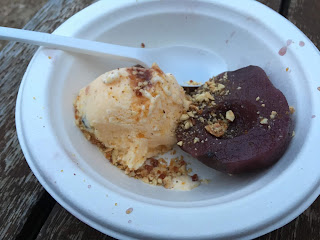It's been a while between Listmanias here but I was very inspired after coming across this list thanks to Eric Karl Anderson and his wonderful booktube channel.
The Times created this list of favourite novels of the 21st century so far. Sadly it is behind a paywall (at least for those of us outside the UK, not sure if it the same for everyone). But Eric discussed all the books, so I can here too. I'm not sure if there was any particular reason for the order, but I've chosen to alphabetise it.
As always there's a few books I've read. Many I've meant to read. Some I've bought. And quite a few where I've not heard of either the author or sometimes that particular book.
A Visit from the Goon Squad - Jennifer Egan (see my review)
All Families are Psychotic - Douglas Coupland
All my Puny Sorrows - Miriam Toews
All That Man Is - David Szalay
All the Light We Cannot See - Anthony Doerr
Americanah - Chimamanda Ngoze Adichie
Any Human Heart - William Boyd
Arlington Park - Rachel Cusk
An Officer and a Spy - Robert Harris
Atonement - Ian McEwen
Breath - Tim Winton
Brooklyn - Colm Toibin
Burial Rites - Hannah Kent (see my review)
Cloud Atlas - David Mitchell
Conversations with Friends - Sally Rooney
Darkmans - Nicola Barker
Daughters of Jerusalem - Charlotte Mendelson
Digging to America - Anne Tyler
Disobedience - Naomi Alderman
Dissolution - CJ Sansom
English Passengers - Matthew Kneale
Fingersmith - Sarah Waters
Gilead - Marilynne Robinson
God's Own Country - Ross Raisin
Golden Hill - Francis Spufford
Grief is the Thing with Feathers - Max Porter
Home - Toni Morrison
Home Fire - Kamila Shamsie
Hope: A Tragedy - Shalom Auslander
How to be Good - Nick Hornby
If Nobody Speaks of Remarkable Things - Jon McGregor
I'll Go to Bed at Noon - Gerard Woodward
Late in the Day - Tessa Hadley
Legend of a Suicide - David Vann
Let the Great World Spin - Colum McCann
Life of Pi - Yann Martel
Lincoln in the Bardo - George Saunders
Little Fires Everywhere - Celeste Ng
Middlesex - Jeffrey Eugenides
Midwinter Break - Bernard MacLaverty (see my review)
Mister Pip - Lloyd Jones
Mothering Sunday - Graham Swift
Never Let Me Go - Kazuo Ishiguro
Notes on a Scandal - Zoë Heller
NW - Zadie Smith
Old Filth - Jane Gardam
Olive Kitteridge - Elizabeth Strout
Small Island - Andrea Levy
Spies - Michael Frayn
Star of the Sea - Joseph O'Connor
Stay with Me - Ayobami Adebayo
The Amazing Adventures of Kavalier & Clay - Michael Chabon
The Blind Assassin - Margaret Atwood
The Book of the Heathen - Robert Edric
The Brief Wondrous Life of Oscar Was - Junot Diaz
The Constant Gardener - John Le Carré
The Corrections - Johnathan Franzen
The Curious Incident of the Dog in the Night-Time - Mark Haddon
The Essex Serpent - Sarah Perry
The Forgiven - Lawrence Osborne
The Green Road - Ann Enright
The Interestings - Meg Wolitzer
The Line of Beauty - Alan Hollinghurst
The Little Red Chairs - Edna O'Brien
The Noise of Time - Julian Barnes
The Plot Against America - Philip Roth
The Road - Cormac McCarthy (see my review)
The Secret River - Kate Grenville
The Secret Scripture - Sebastian Barry
The Siege - Helen Dunmore
The Son - Philipp Myer
The Underground Railroad - Colson Whitehead
The We Came to the End - Joshua Ferris
The White Tiger - Aravind Adiga
The Year of Runaways - Sunjeev Sahota
The Yellow Birds - Kevin Powers
The Zone of Interest - Martin Amis
Train Dreams - Denis Johnson
True History of the Kelly Gang - Peter Carey
We Need to Talk About Kevin - Lionel Shriver
West - Carys Davies
Wolf Hall - Hilary Mantel
You Don't Have to Live Like This - Benjamin Markovits
Novels in Translation
All for Nothing - Walter Kempowski
Alone in Berlin - Hans Fallada
Austerlitz - W.G Sebald
Flights - Olga Tokarczuk
Frog - Mo Yan
Limonov - Emmanuel Carrère
Lullaby - Leila Slimani (see my review)
My Brilliant Friend - Elena Ferrante
Submission - Michel Houellebecq
Suite Francaise - Irène Némirovsky
The Explosion Chronicles - Yan Lianke
The Great Swindle - Pierre Lemaitre
The Unseen - Roy Jacobsen
The Yacoubian Building - Alaa Al Aswany
War & Turpentine - Stefan Hertmans
Your Face Tomorrow Trilogy - Javier Marias
15/100
2 DNF
Did I Love those 21st Century Novels that I have read? Pretty much yes. I certainly loved, and remember loving English Passengers, Burial Rites, We Need to Talk About Kevin, True History of the Kelly Gang, The Road, and The Curious Incident of the Dog in the Night-Time (and I saw the totally amazing stage adaptation in Sydney last year). I had forgotten that I loved A Visit from the Goon Squad. And I really, really hated The Life of Pi. Well I loved it until the end, and then I think I literally threw it across the room.
15 isn't a bad effort for me, but I've shamefully not read any of the works in translation. Several of them are of course waiting for me on my shelves. So much more work to do...
July 2020 16/100







































